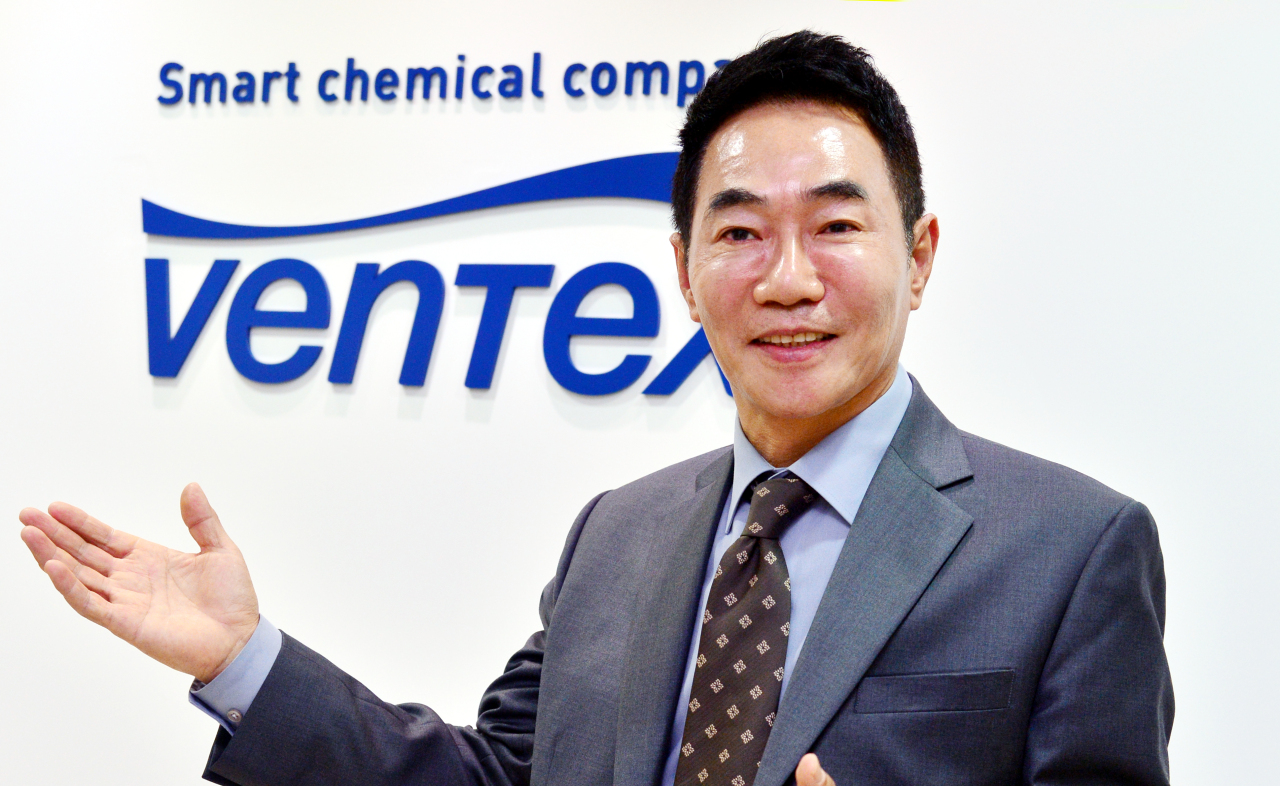Founded in 1999 as a textile company in South Korea, Ventex took a risk and ventured into uncharted territory, and fortunately, that paid off.
The company, which used to produce chemical materials for functional textile products, now makes antibacterial biochemical materials with a much wider range of applications, including hand sanitizer, cosmetics, textbooks, paints and sanitization and deodorization solutions.
Behind the dramatic transformation was sustained investment in research and development, said Ventex founder and CEO Go Gyeong-chan, who himself earned doctorate degrees in organic material engineering and medicine.
“Ventex is now a biochemical company,” he said during an interview with The Korea Herald.
Ventex now holds 93 patents registered with the Korean authorities, up from around 70 in 2016. According to local patent grading system operator Wisdomain, the patent grading of Ventex in 2019 was higher than some of the bigger and more established companies belonging to big business groups here, including Hanwha Total and Kolon Glotech.
Although its products span a wide range of fields related to heat, water and air, such as waterproof textile Breamax to heat-generating and insulating Solarball, Go sees huge potential in new materials made of mineral compounds,
With the brand Healtha Clean, the company has developed a lineup of disinfection products using the material, which Go explained is harmless to human body and nature.
Of them, an antibacterial spray has garnered much attention from global markets amid the COVID-19 pandemic, the CEO said.
The Healtha Clean spray differs from other products in the market as it uses eco-friendly, odorless and harmless minerals, but is highly effective in killing germs.
The product is certified by third party institutes for its capability to eliminate 99.9 percent of pneumococcus, colon bacillus, and staphylococcus aureus. The Korea Testing & Research Institute has also confirmed that it kills 99.99 percent of RNA viruses, Go said.
The spray’s antibacterial effect is also more long lasting than other products using volatile ethanol, he noted.
“Unlike other sanitizing products, Healtha Clean stays on much longer,” Go said. The company claims that facial masks applied with a layer of Healtha Clean can ward off bacteria even after 50 washes.
Ventex is looking to supply Healtha Clean to municipal governments, big organizations and companies in need of such material to disinfect their buildings and facilities, the CEO said.
It will be first used in Coupang’s distribution centers and at the governmental office building of Paju, Gyeonggi Province, according to Go.
Healtha Clean, which has passed skin irritation tests, can be applied basically anywhere, he said.
“The antibacterial material would be applied to the state-designated textbooks starting in the second half this year,” Go said.
Car interior parts and filters are another example. The company currently has partnerships with local automotive interior part makers to supply their products to auto manufacturers, including Hyundai Motor.
Ventex is also working with South Korea’s leading interior and lifestyle company Hanssem. The interior company is using the material to rid of cancer-causing chemicals used in commercial adhesives, Go said.
Aside from property disinfection, the material has proven its effectiveness in removal of odor and toxic chemicals such as formaldehyde, the company explained.
With local cosmetics firm Cosmax, Ventex is developing cosmetics, deodorants, hair and body care products by using the material, Go added.
“The biggest industries that Ventex can enter with the new material at this moment, however, are the wastewater treatment and livestock industries,” the Ventex CEO said.
Go said Ventex has finished development of products and solutions that would be used in local wastewater treatment plants and livestock farms.
“The company has developed a disinfection system that uses sprinkler heads, which spray Healtha Hem products from the ceilings, to remove bad smells and sanitize livestock farming facilities,” Go said.
Healtha Hem is a new material consisting of Healtha Clean and 97 different types of useful microorganisms. Healtha Hem is specially developed to treat organic residues at livestock farming facilities. It can be also used to deodorize and sanitize objects or an area.
Ventex would begin introducing the disinfection system at local farms, starting in cities in Gyeongsang and Jeolla provinces. The company plans to export Healtha Hem products and the disinfection system to foreign countries in the near future.
The CEO anticipates that sales of Healtha Clean and Healtha Hem products would continue to increase in the future.
“The COVID-19 pandemic has brought enormous changes to human cultures. People would continue to wear masks and wash their hands more often. The related markets would continue to grow as more people would show greater interest in hygiene and safety,” Go said.
Go expects the company’s annual sales this year to reach 38.4 billion won ($34.3 million) this year. Among the total, sales of Healtha Clean, as well as Healtha Hem products and related solutions, are expected to account for 20 billion won.
The company’s combined sales in 2023 could grow to 106.5 billion won, backed by increasing demand for the company’s biochemical products.
”The company expects the sales of its biochemical products would account for 56 percent in 2023,“ Go said.
The company has plans to list its shares on the stock market that year through an initial public offering, he added.
By Shim Woo-hyun (
ws@heraldcorp.com)




![[Herald Interview] 'Trump will use tariffs as first line of defense for American manufacturing'](http://res.heraldm.com/phpwas/restmb_idxmake.php?idx=644&simg=/content/image/2024/11/26/20241126050017_0.jpg)

![[Health and care] Getting cancer young: Why cancer isn’t just an older person’s battle](http://res.heraldm.com/phpwas/restmb_idxmake.php?idx=644&simg=/content/image/2024/11/26/20241126050043_0.jpg)

![[Graphic News] International marriages on rise in Korea](http://res.heraldm.com/phpwas/restmb_idxmake.php?idx=644&simg=/content/image/2024/11/25/20241125050091_0.gif)